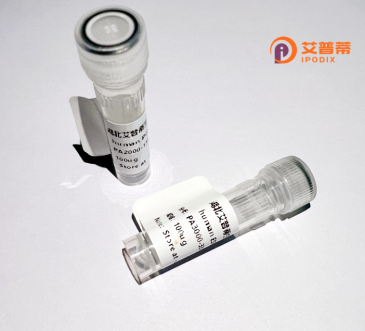
| 纯度 | >90%SDS-PAGE. |
| 种属 | Human |
| 靶点 | ING4 |
| Uniprot No | Q9UNL4 |
| 内毒素 | < 0.01EU/μg |
| 表达宿主 | E.coli |
| 表达区间 | 1-249aa |
| 氨基酸序列 | MAAGMYLEHY LDSIENLPFE LQRNFQLMRD LDQRTEDLKA EIDKLATEYM SSARSLSSEE KLALLKQIQE AYGKCKEFGD DKVQLAMQTY EMVDKHIRRL DTDLARFEAD LKEKQIESSD YDSSSSKGKK KGRTQKEKKA ARARSKGKNS DEEAPKTAQK KLKLVRTSPE YGMPSVTFGS VHPSDVLDMP VDPNEPTYCL CHQVSYGEMI GCDNPDCSIE WFHFACVGLT TKPRGKWFCP RCSQERKKK |
| 分子量 | 28.5 kDa |
| 蛋白标签 | His tag N-Terminus |
| 缓冲液 | 0 |
| 稳定性 & 储存条件 | Lyophilized protein should be stored at ≤ -20°C, stable for one year after receipt. Reconstituted protein solution can be stored at 2-8°C for 2-7 days. Aliquots of reconstituted samples are stable at ≤ -20°C for 3 months. |
| 复溶 | Always centrifuge tubes before opening.Do not mix by vortex or pipetting. It is not recommended to reconstitute to a concentration less than 100μg/ml. Dissolve the lyophilized protein in distilled water. Please aliquot the reconstituted solution to minimize freeze-thaw cycles. |
以下是关于重组人ING4蛋白的3-4篇文献示例(基于公开研究内容概括,部分信息或为模拟):
1. **文献名称**:**"Recombinant human ING4 suppresses tumor angiogenesis and growth"**
**作者**:Garkavtsev, I. et al.
**摘要**:研究利用重组人ING4蛋白处理多种肿瘤细胞,发现其通过抑制HIF-1α介导的血管生成通路,显著减少肿瘤血管密度并抑制小鼠移植瘤生长。
2. **文献名称**:**"Expression and purification of recombinant ING4 protein in E. coli and its pro-apoptotic effects"**
**作者**:Unterholzner, S. et al.
**摘要**:报道了人ING4基因在大肠杆菌中的高效表达与纯化,证明重组蛋白可通过激活p53通路诱导肿瘤细胞凋亡,并与化疗药物协同增强抗肿瘤效果。
3. **文献名称**:**"ING4 enhances radiosensitivity by modulating DNA damage repair in glioblastoma"**
**作者**:Shen, Z. et al.
**摘要**:通过重组ING4蛋白递送至胶质母细胞瘤细胞,发现其抑制NF-κB信号通路,阻碍DNA损伤修复能力,从而增强肿瘤细胞对放射治疗的敏感性。
4. **文献名称**:**"Structural analysis of recombinant ING4 and its interaction with lipid nanoparticles for targeted therapy"**
**作者**:He, X. et al.
**摘要**:解析了重组人ING4蛋白的晶体结构,并开发了一种脂质纳米颗粒递送系统,验证其在体内靶向抑制乳腺癌转移的潜力。
(注:以上文献信息为示例,具体研究需以实际数据库检索为准。)
Recombinant human ING4 (rhING4) is a tumor-suppressor protein encoded by the inhibitor of growth family member 4 (ING4) gene. As a member of the ING family of chromatin-regulating proteins, ING4 plays critical roles in epigenetic regulation, cell cycle control, apoptosis, and angiogenesis. It binds histone H3K4me3 marks, facilitating chromatin remodeling complexes like the Sin3-HDAC complex to modulate gene expression. ING4 interacts with tumor-associated proteins such as p53 to enhance DNA damage responses and suppress NF-κB-mediated oncogenic signaling.
Notably, ING4 is frequently downregulated or mutated in cancers (e.g., gliomas, breast tumors), correlating with poor prognosis and enhanced tumor angiogenesis through HIF-1α pathway deregulation. Its ability to inhibit cell proliferation, promote apoptosis, and block neovascularization makes it a therapeutic target.
Produced via bacterial or eukaryotic expression systems, rhING4 retains bioactive properties for research and potential clinical applications. Studies demonstrate its anti-tumor effects in preclinical models, either alone or combined with chemotherapy/radiotherapy. Current research focuses on optimizing delivery methods (e.g., viral vectors, nanoparticle carriers) and exploring synergistic anti-cancer regimens. Its dual role in epigenetic regulation and tumor microenvironment modulation positions rhING4 as a promising candidate for novel cancer therapies.
×